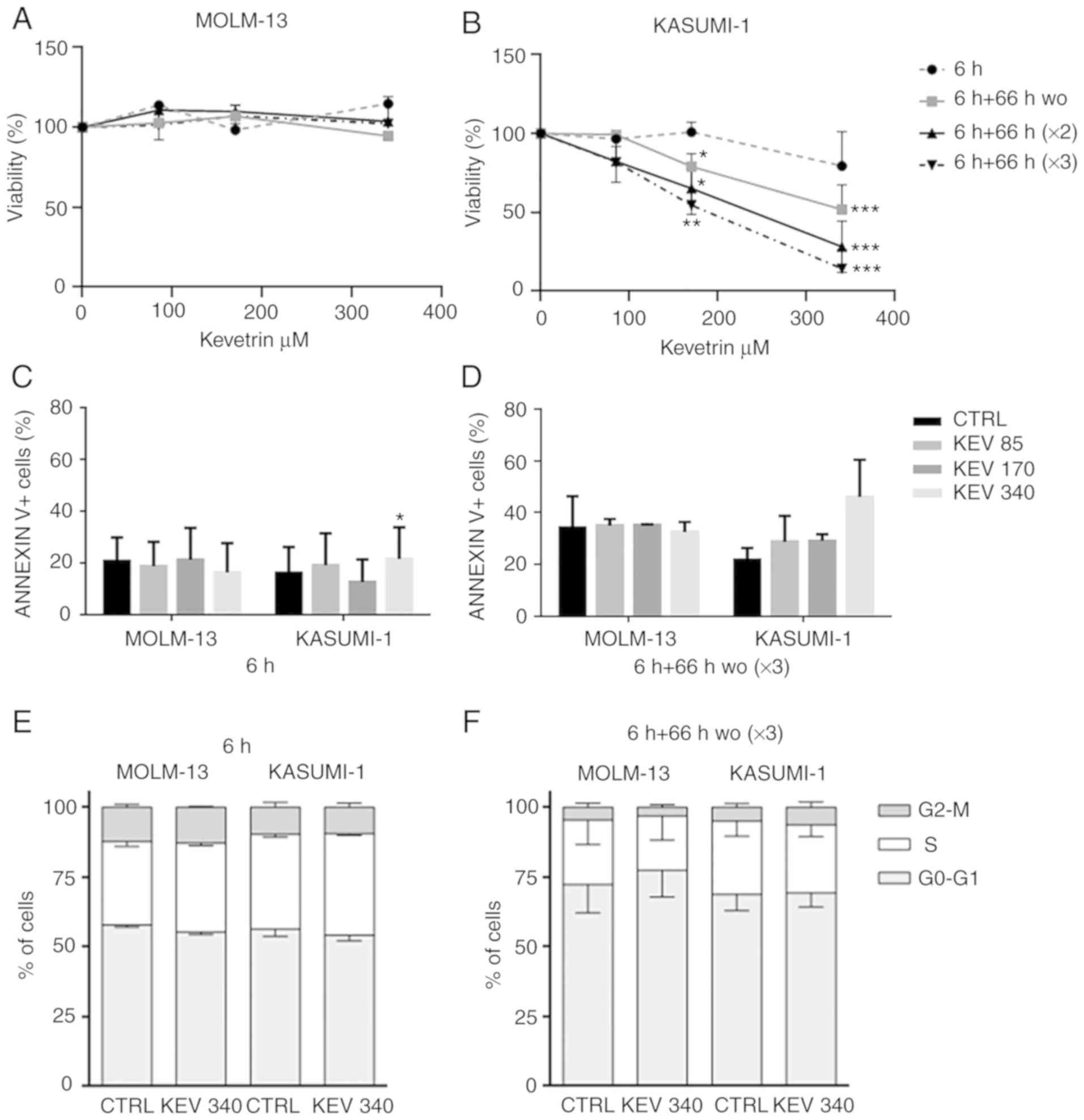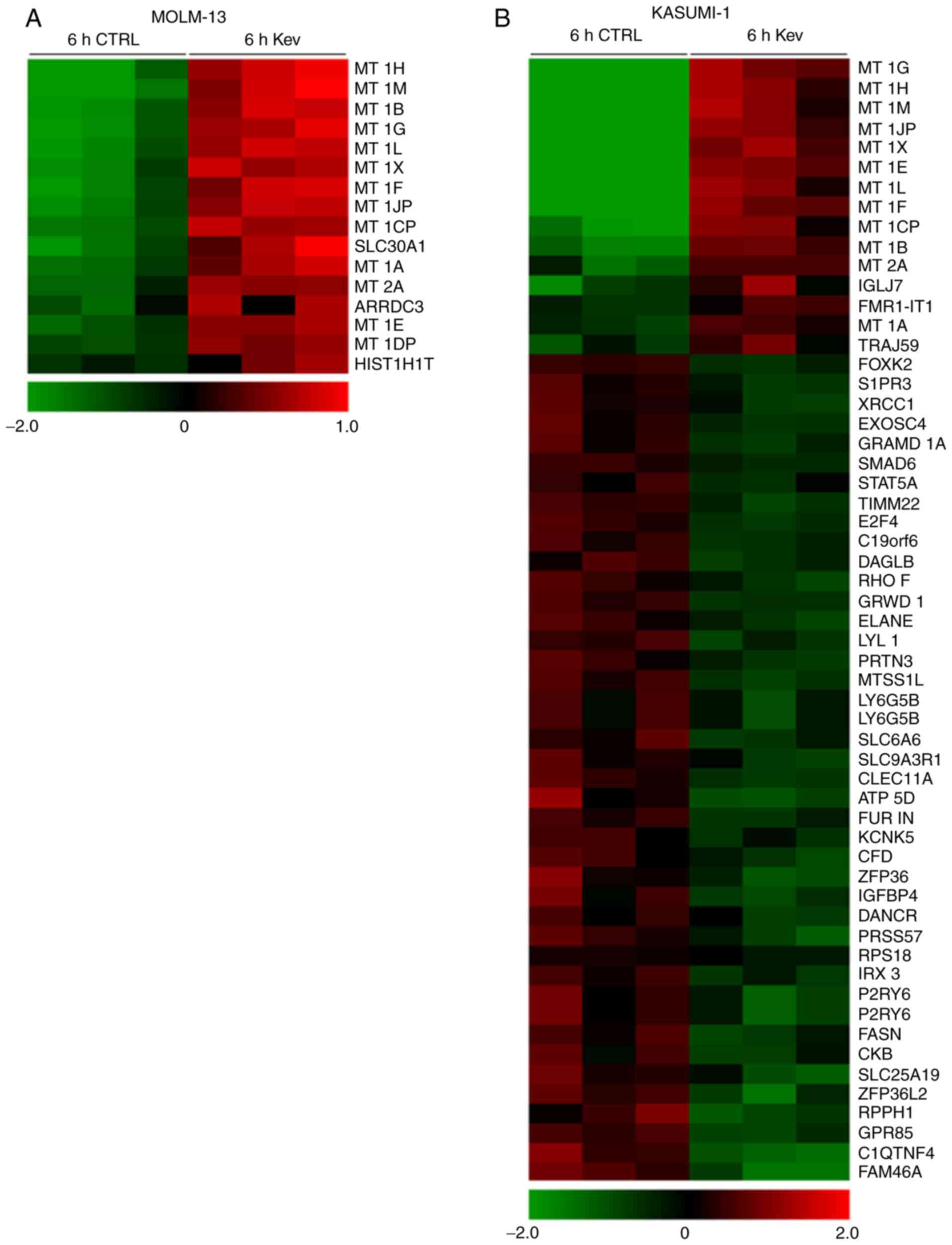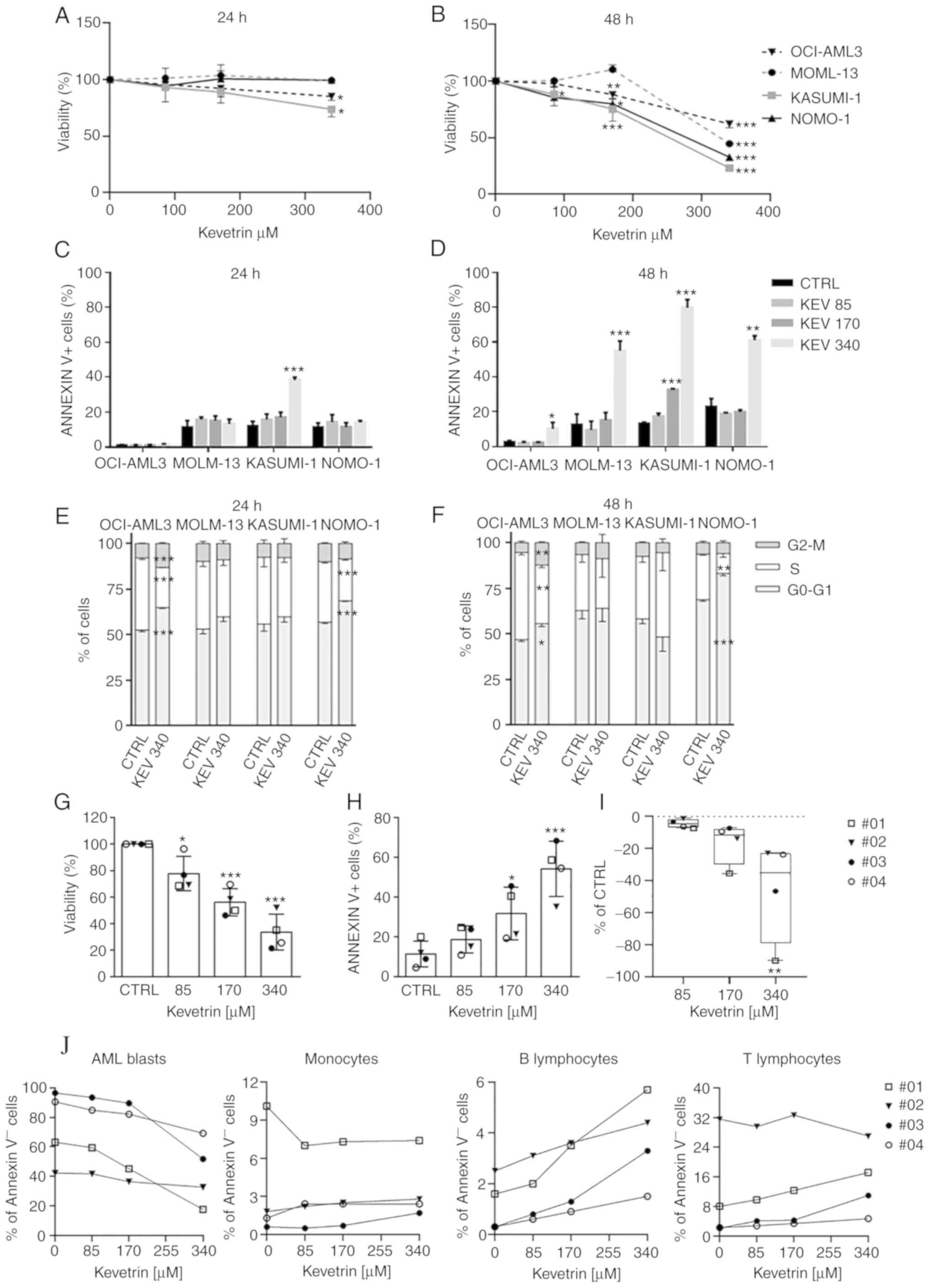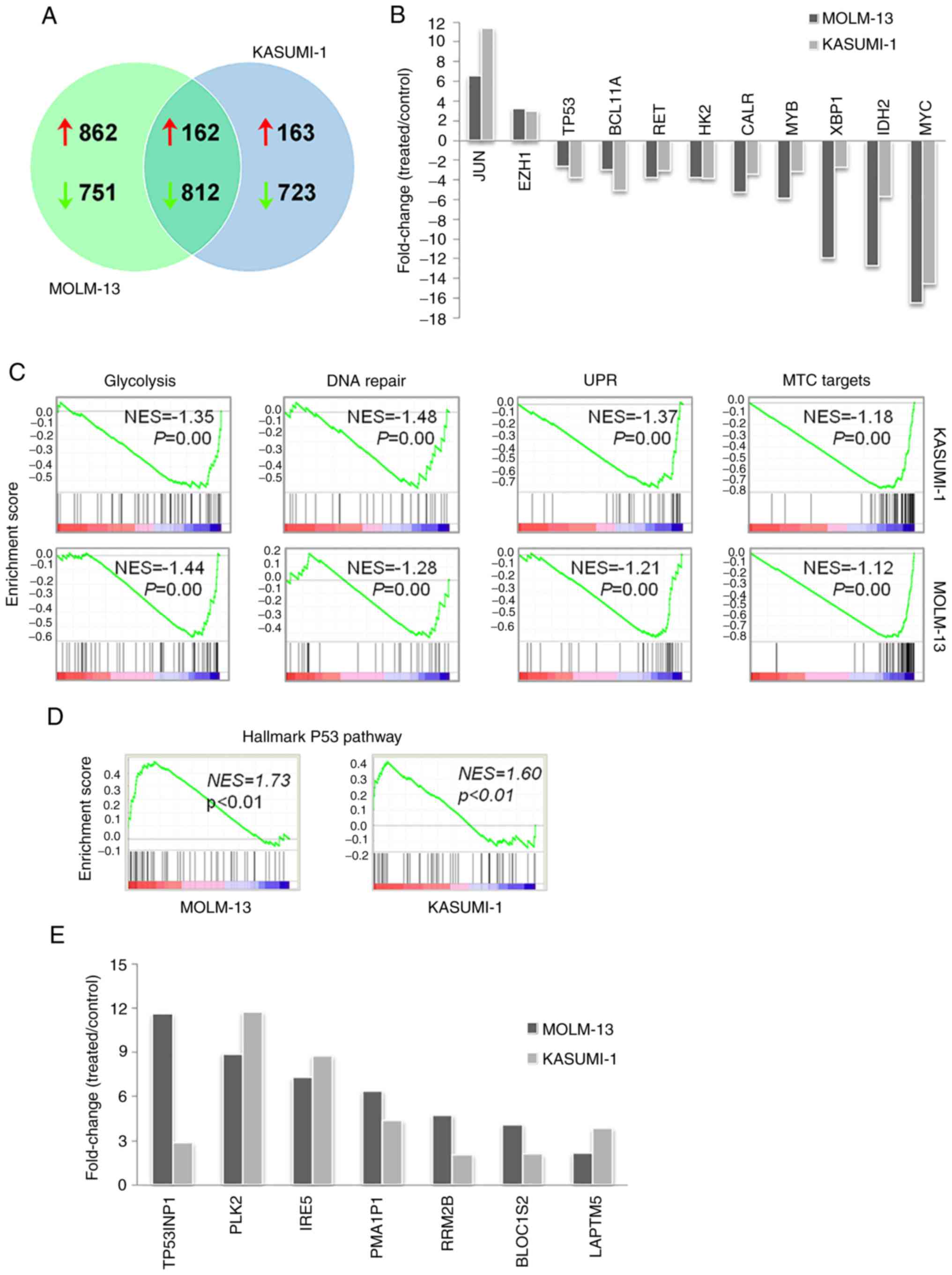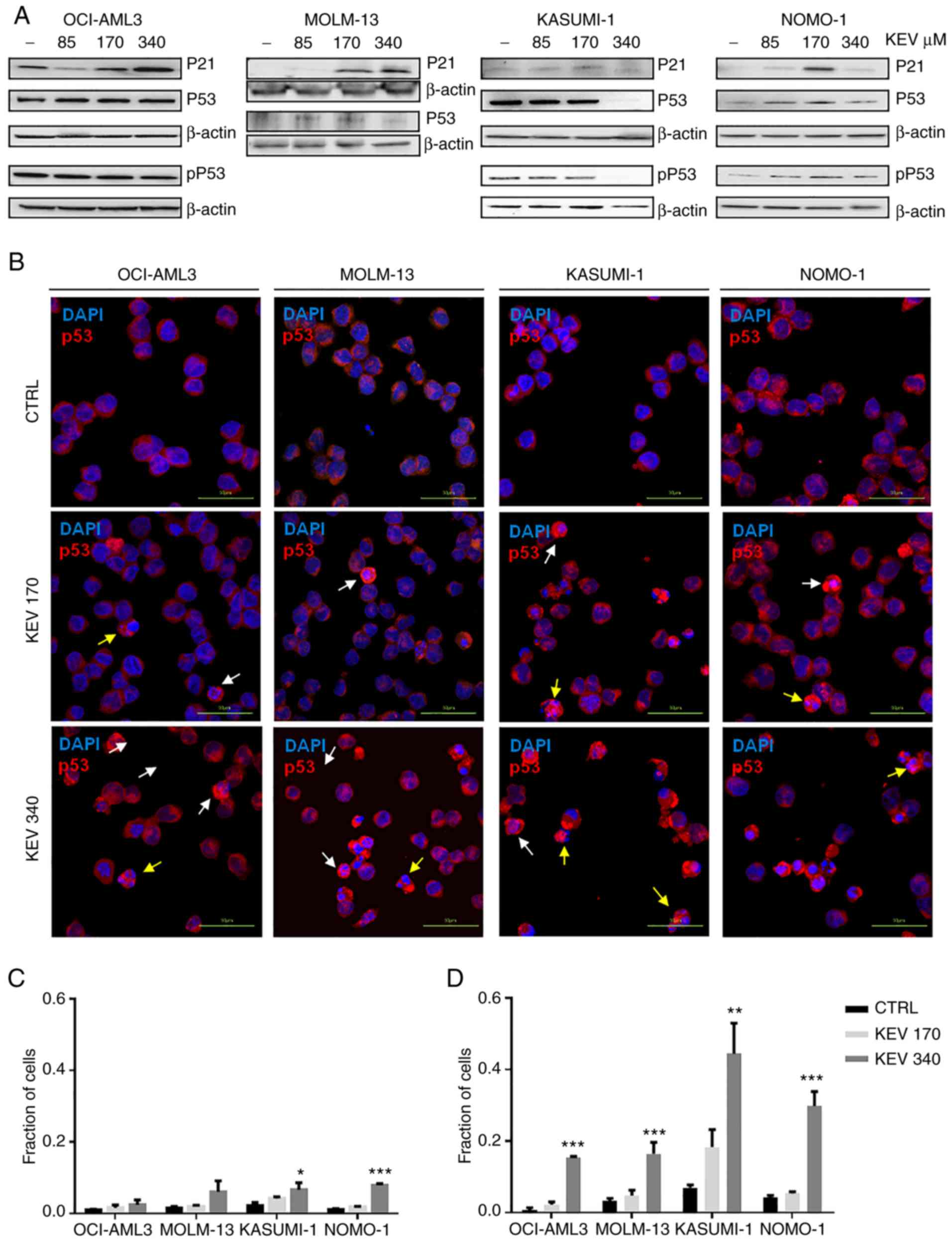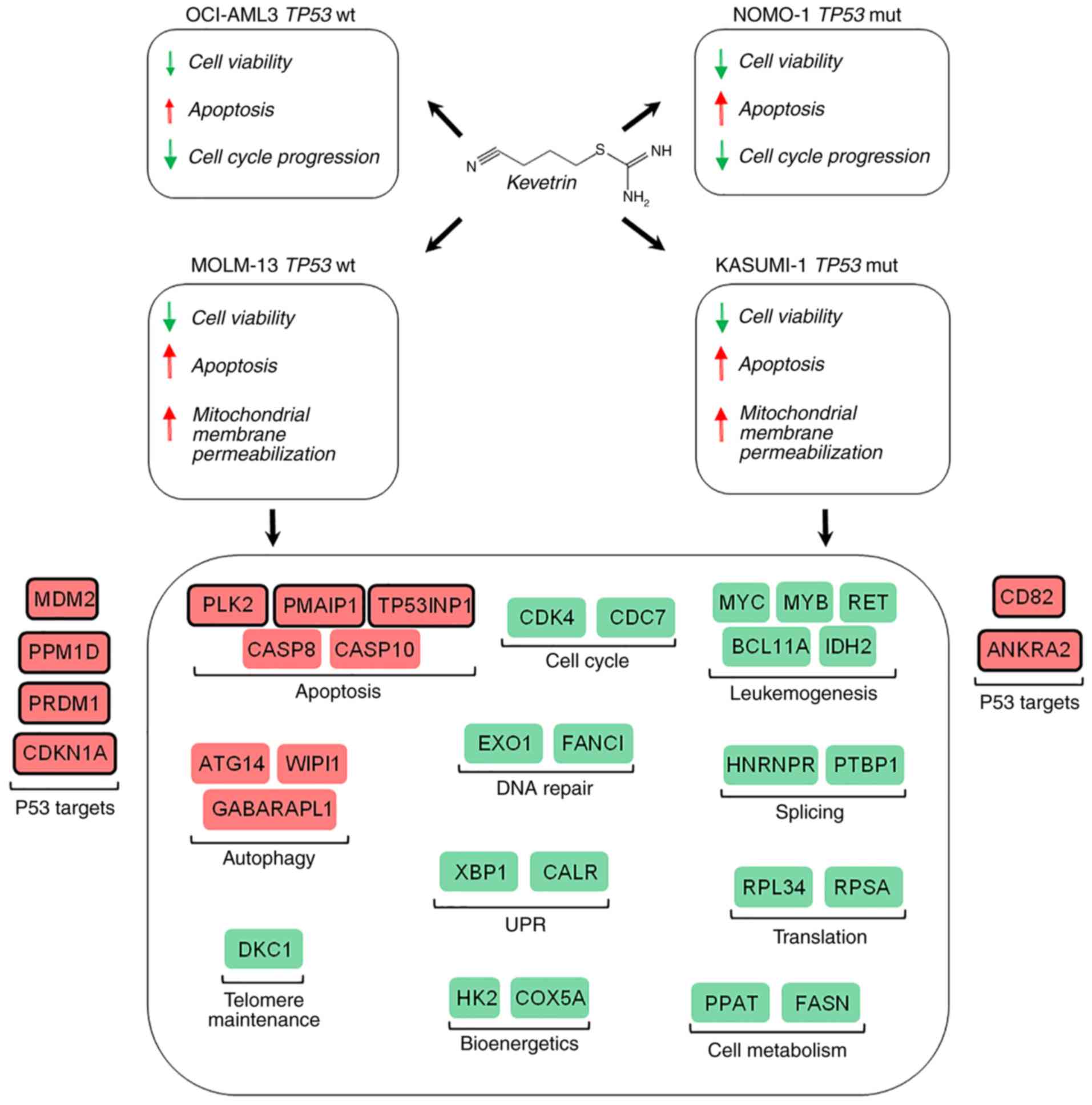|
1
|
Döhner H, Weisdorf DJ and Bloomfield CD:
Acute myeloid leukemia. N Engl J Med. 373:1136–1152. 2015.
View Article : Google Scholar : PubMed/NCBI
|
|
2
|
Döhner H, Estey E, Grimwade D, Amadori S,
Appelbaum FR, Büchner T, Dombret H, Ebert BL, Fenaux P, Larson RA,
et al: Diagnosis and management of AML in adults: 2017 ELN
recommendations from an international expert panel. Blood.
129:424–447. 2017. View Article : Google Scholar : PubMed/NCBI
|
|
3
|
Cancer Genome Atlas Research Network, ;
Ley TJ, Miller C, Ding L, Raphael BJ, Mungall AJ, Robertson AG,
Hoadley K, Triche TJ Jr, Laird PW, et al: Genomic and epigenomic
landscapes of adult de novo acute myeloid leukemia. N Engl J Med.
368:2059–2074. 2013. View Article : Google Scholar : PubMed/NCBI
|
|
4
|
Haferlach C, Dicker F, Herholz H,
Schnittger S, Kern W and Haferlach T: Mutations of the TP53 gene in
acute myeloid leukemia are strongly associated with a complex
aberrant karyotype. Leukemia. 22:1539–1541. 2008. View Article : Google Scholar : PubMed/NCBI
|
|
5
|
Rücker FG, Schlenk RF, Bullinger L, Kayser
S, Teleanu V, Kett H, Habdank M, Kugler CM, Holzmann K, Gaidzik VI,
et al: TP53 alterations in acute myeloid leukemia with complex
karyotype correlate with specific copy number alterations,
monosomal karyotype, and dismal outcome. Blood. 119:2114–2121.
2012. View Article : Google Scholar : PubMed/NCBI
|
|
6
|
Leung GMK, Zhang C, Ng NKL, Yang N, Lam
SSY, Au CH, Chan TL, Ma ESK, Tsui SP, Ip HW, et al: Distinct
mutation spectrum, clinical outcome and therapeutic responses of
typical complex/monosomy karyotype acute myeloid leukemia carrying
TP53 mutations. Am J Hematol. 94:650–657. 2019. View Article : Google Scholar : PubMed/NCBI
|
|
7
|
Fontana MC, Marconi G, Feenstra JDM, Fonzi
E, Papayannidis C, Ghelli Luserna di Rorá A, Padella A, Solli V,
Franchini E, Ottaviani E, et al: Chromothripsis in acute myeloid
leukemia: Biological features and impact on survival. Leukemia.
32:1609–1620. 2018. View Article : Google Scholar : PubMed/NCBI
|
|
8
|
Rücker FG, Dolnik A, Blätte TJ, Teleanu V,
Ernst A, Thol F, Heuser M, Ganser A, Döhner H, Döhner K and
Bullinger L: Chromothripsis is linked to TP53 alteration, cell
cycle impairment, and dismal outcome in acute myeloid leukemia with
complex karyotype. Haematologica. 103:e17–e20. 2018. View Article : Google Scholar : PubMed/NCBI
|
|
9
|
Papaemmanuil E, Gerstung M, Bullinger L,
Gaidzik VI, Paschka P, Roberts ND, Potter NE, Heuser M, Thol F,
Bolli N, et al: Genomic classification and prognosis in acute
myeloid leukemia. N Engl J Med. 374:2209–2221. 2016. View Article : Google Scholar : PubMed/NCBI
|
|
10
|
Simonetti G, Padella A, do Valle IF,
Fontana MC, Fonzi E, Bruno S, Baldazzi C, Guadagnuolo V, Manfrini
M, Ferrari A, et al: Aneuploid acute myeloid leukemia exhibits a
signature of genomic alterations in the cell cycle and protein
degradation machinery. Cancer. 125:712–725. 2019. View Article : Google Scholar : PubMed/NCBI
|
|
11
|
Brosh R and Rotter V: When mutants gain
new powers: News from the mutant p53 field. Nat Rev Cancer.
9:701–713. 2009. View Article : Google Scholar : PubMed/NCBI
|
|
12
|
Kandoth C, McLellan MD, Vandin F, Ye K,
Niu B, Lu C, Xie M, Zhang Q, McMichael JF, Wyczalkowski MA, et al:
Mutational landscape and significance across 12 major cancer types.
Nature. 502:333–339. 2013. View Article : Google Scholar : PubMed/NCBI
|
|
13
|
Scoumanne A and Chen X: Protein
methylation: A new mechanism of p53 tumor suppressor regulation.
Histol Histopathol. 23:1143–1149. 2008.PubMed/NCBI
|
|
14
|
Honda R, Tanaka H and Yasuda H:
Oncoprotein MDM2 is a ubiquitin ligase E3 for tumor suppressor p53.
FEBS Lett. 420:25–27. 1997. View Article : Google Scholar : PubMed/NCBI
|
|
15
|
Whitesell L and Lindquist SL: HSP90 and
the chaperoning of cancer. Nat Rev Cancer. 5:761–772. 2005.
View Article : Google Scholar : PubMed/NCBI
|
|
16
|
Bieging KT, Mello SS and Attardi LD:
Unravelling mechanisms of p53-mediated tumour suppression. Nat Rev
Cancer. 14:359–370. 2014. View Article : Google Scholar : PubMed/NCBI
|
|
17
|
Lakin ND and Jackson SP: Regulation of p53
in response to DNA damage. Oncogene. 18:7644–7655. 1999. View Article : Google Scholar : PubMed/NCBI
|
|
18
|
Kumar A, Hiran T, Holden SA, Chafai-Fadela
K, Rogers S, Ram S and Menon K: Kevetrin™, a novel small molecule,
activates p53, enhances expression of p21, induces cell cycle
arrest and apoptosis in a human cancer cell line. Cancer Res.
71:44702011.
|
|
19
|
Kumar A, Holden SA, Chafai-Fadela K, Ram S
and Menon KE: Kevetrin targets both MDM2-p53 and Rb-E2F pathways in
tumor suppression. Cancer Res. 72:28742012.
|
|
20
|
Kumar A, Brennan DP, Chafai-Fadela K,
Holden SA, Ram S, Shapiro GI and Menon GI: Kevetrin induces
p53-dependent and independent cell cycle arrest and apoptosis in
ovarian cancer cell lines representing heterogeneous histologies.
Cancer Res. 77:3222017.
|
|
21
|
Huang DW, Sherman BT and Lempicki RA:
Systematic and integrative analysis of large gene lists using DAVID
bioinformatics resources. Nat Protoc. 4:44–57. 2009. View Article : Google Scholar : PubMed/NCBI
|
|
22
|
Subramanian A, Tamayo P, Mootha VK,
Mukherjee S, Ebert BL, Gillette MA, Paulovich A, Pomeroy SL, Golub
TR, Lander ES and Mesirov JP: Gene set enrichment analysis: A
knowledge-based approach for interpreting genome-wide expression
profiles. Proc Natl Acad Sci USA. 102:15545–15550. 2005. View Article : Google Scholar : PubMed/NCBI
|
|
23
|
Mootha VK, Lindgren CM, Eriksson KF,
Subramanian A, Sihag S, Lehar J, Puigserver P, Carlsson E,
Ridderstråle M, Laurila E, et al: PGC-1alpha-responsive genes
involved in oxidative phosphorylation are coordinately
downregulated in human diabetes. Nat Genet. 34:267–273. 2003.
View Article : Google Scholar : PubMed/NCBI
|
|
24
|
Fischer M: Census and evaluation of p53
target genes. Oncogene. 36:3943–3956. 2017. View Article : Google Scholar : PubMed/NCBI
|
|
25
|
Muller PA and Vousden KH: P53 mutations in
cancer. Nat Cell Biol. 15:2–8. 2013. View Article : Google Scholar : PubMed/NCBI
|
|
26
|
Prokocimer M, Molchadsky A and Rotter V:
Dysfunctional diversity of p53 proteins in adult acute myeloid
leukemia: Projections on diagnostic workup and therapy. Blood.
130:699–712. 2017. View Article : Google Scholar : PubMed/NCBI
|
|
27
|
Takahashi S: Molecular functions of
metallothionein and its role in hematological malignancies. J
Hematol Oncol. 5:412012. View Article : Google Scholar : PubMed/NCBI
|
|
28
|
Basu A and Krishnamurthy S: Cellular
responses to cisplatin-induced DNA damage. J Nucleic Acids.
2010:2013672010. View Article : Google Scholar : PubMed/NCBI
|
|
29
|
Tao YF, Xu LX, Lu J, Cao L, Li ZH, Hu SY,
Wang NN, Du XJ, Sun LC, Zhao WL, et al: Metallothionein III (MT3)
is a putative tumor suppressor gene that is frequently inactivated
in pediatric acute myeloid leukemia by promoter hypermethylation. J
Transl Med. 12:1822014. View Article : Google Scholar : PubMed/NCBI
|
|
30
|
Ostrakhovitch EA, Olsson PE, Jiang S and
Cherian MG: Interaction of metallothionein with tumor suppressor
p53 protein. FEBS Lett. 580:1235–1238. 2006. View Article : Google Scholar : PubMed/NCBI
|
|
31
|
Méplan C, Richard MJ and Hainaut P:
Metalloregulation of the tumor suppressor protein p53: Zinc
mediates the renaturation of p53 after exposure to metal chelators
in vitro and in intact cells. Oncogene. 19:5227–5236. 2000.
View Article : Google Scholar : PubMed/NCBI
|
|
32
|
Habel N, Hamidouche Z, Girault I,
Patiño-García A, Lecanda F, Marie PJ and Fromigué O: Zinc
chelation: A metallothionein 2A's mechanism of action involved in
osteosarcoma cell death and chemotherapy resistance. Cell Death
Dis. 4:e8742013. View Article : Google Scholar : PubMed/NCBI
|
|
33
|
Chatterjee A, Ghosh J, Ramdas B, Mali RS,
Martin H, Kobayashi M, Vemula S, Canela VH, Waskow ER, Visconte V,
et al: Regulation of Stat5 by FAK and PAK1 in oncogenic FLT3- and
KIT-driven leukemogenesis. Cell Rep. 9:1333–1348. 2014. View Article : Google Scholar : PubMed/NCBI
|
|
34
|
Benson EK, Mungamuri SK, Attie O,
Kracikova M, Sachidanandam R, Manfredi JJ and Aaronson SA:
p53-dependent gene repression through p21 is mediated by
recruitment of E2F4 repression complexes. Oncogene. 33:3959–3969.
2014. View Article : Google Scholar : PubMed/NCBI
|
|
35
|
Kayama K, Watanabe S, Takafuji T, Tsuji T,
Hironaka K, Matsumoto M, Nakayama KI, Enari M, Kohno T, Shiraishi
K, et al: GRWD1 negatively regulates p53 via the RPL11-MDM2 pathway
and promotes tumorigenesis. EMBO Rep. 18:123–137. 2017. View Article : Google Scholar : PubMed/NCBI
|
|
36
|
Shapiro G, Mier JW, Hilton JF, Gandhi L,
Chau NG, Bullock AJ, Supko JG, Verselis SJ, Murgo K, Sze C, et al:
A phase 1, dose-escalation, safety, pharmacokinetic,
pharmacodynamic study of thioureidobutyronitrile, a novel p53
targeted therapy, in patients with advanced solid tumors. J Clin
Oncol. 33 (Suppl 15):TPS26132015. View Article : Google Scholar
|
|
37
|
Zhao Y, Si L, Zhang W, Huang W and Wang R:
ELANE is highly expressed in leukemia patients and predicts poor
survival. Int J Clin Exp Med. 12:3153–3160. 2019.
|
|
38
|
Rangatia J, Vangala RK, Singh SM, Zada
AAP, Elsässer A, Kohlmann A, Haferlach T, Tenen DG, Hiddemann W and
Behre G: Elevated c-Jun expression in acute myeloid leukemias
inhibits C/EBPalpha DNA binding via leucine zipper domain
interaction. Oncogene. 22:4760–4764. 2003. View Article : Google Scholar : PubMed/NCBI
|
|
39
|
Schreiber M, Kolbus A, Piu F, Szabowski A,
Möhle-Steinlein U, Tian J, Karin M, Angel P and Wagner EF: Control
of cell cycle progression by c-Jun is p53 dependent. Genes Dev.
13:607–619. 1999. View Article : Google Scholar : PubMed/NCBI
|
|
40
|
Fujita S, Honma D, Adachi N, Araki K,
Takamatsu E, Katsumoto T, Yamagata K, Akashi K, Aoyama K, Iwama A
and Kitabayashi I: Dual inhibition of EZH1/2 breaks the quiescence
of leukemia stem cells in acute myeloid leukemia. Leukemia.
32:855–864. 2018. View Article : Google Scholar : PubMed/NCBI
|
|
41
|
Zhou C, Martinez E, Di Marcantonio D,
Solanki-Patel N, Aghayev T, Peri S, Ferraro F, Skorski T, Scholl C,
Fröhling S, et al: JUN is a key transcriptional regulator of the
unfolded protein response in acute myeloid leukemia. Leukemia.
31:1196–1205. 2017. View Article : Google Scholar : PubMed/NCBI
|
|
42
|
Dolores Delgado M and León J: Myc roles in
hematopoiesis and leukemia. Genes Cancer. 1:605–616. 2010.
View Article : Google Scholar : PubMed/NCBI
|
|
43
|
Hoffman B, Amanullah A, Shafarenko M and
Liebermann DA: The proto-oncogene c-myc in hematopoietic
development and leukemogenesis. Oncogene. 21:3414–3421. 2002.
View Article : Google Scholar : PubMed/NCBI
|
|
44
|
Hoffman B and Liebermann DA: Apoptotic
signaling by c-MYC. Oncogene. 27:6462–6472. 2008. View Article : Google Scholar : PubMed/NCBI
|
|
45
|
Liu P, Keller JR, Ortiz M, Tessarollo L,
Rachel RA, Nakamura T, Jenkins NA and Copeland NG: Bcl11a is
essential for normal lymphoid development. Nat Immunol. 4:525–532.
2003. View Article : Google Scholar : PubMed/NCBI
|
|
46
|
Yu Y, Wang J, Khaled W, Burke S, Li P,
Chen X, Yang W, Jenkins NA, Copeland NG, Zhang S and Liu P: Bcl11a
is essential for lymphoid development and negatively regulates p53.
J Exp Med. 209:2467–2483. 2012. View Article : Google Scholar : PubMed/NCBI
|
|
47
|
Im AP, Sehgal AR, Carroll MP, Smith BD,
Tefferi A, Johnson DE and Boyiadzis M: DNMT3A and IDH mutations in
acute myeloid leukemia and other myeloid malignancies: Associations
with prognosis and potential treatment strategies. Leukemia.
28:1774–1783. 2014. View Article : Google Scholar : PubMed/NCBI
|
|
48
|
Shapiro G, Supko JG, Cho DC, Hilton JF,
Hadfield M, Pruitt-Thompson S, Bordoli-Trachsela E, Zvereva N,
Wolanski A, Sato-DiLorenzo A, et al: A phase I, dose-escalation,
safety, pharmacokinetic, pharmacodynamic study of
thioureidobutyronitrile, a novel p53 targeted therapy, in patients
with advanced solid tumors. J Clin Oncol. 31 (Suppl
15):TPS26272013. View Article : Google Scholar
|















